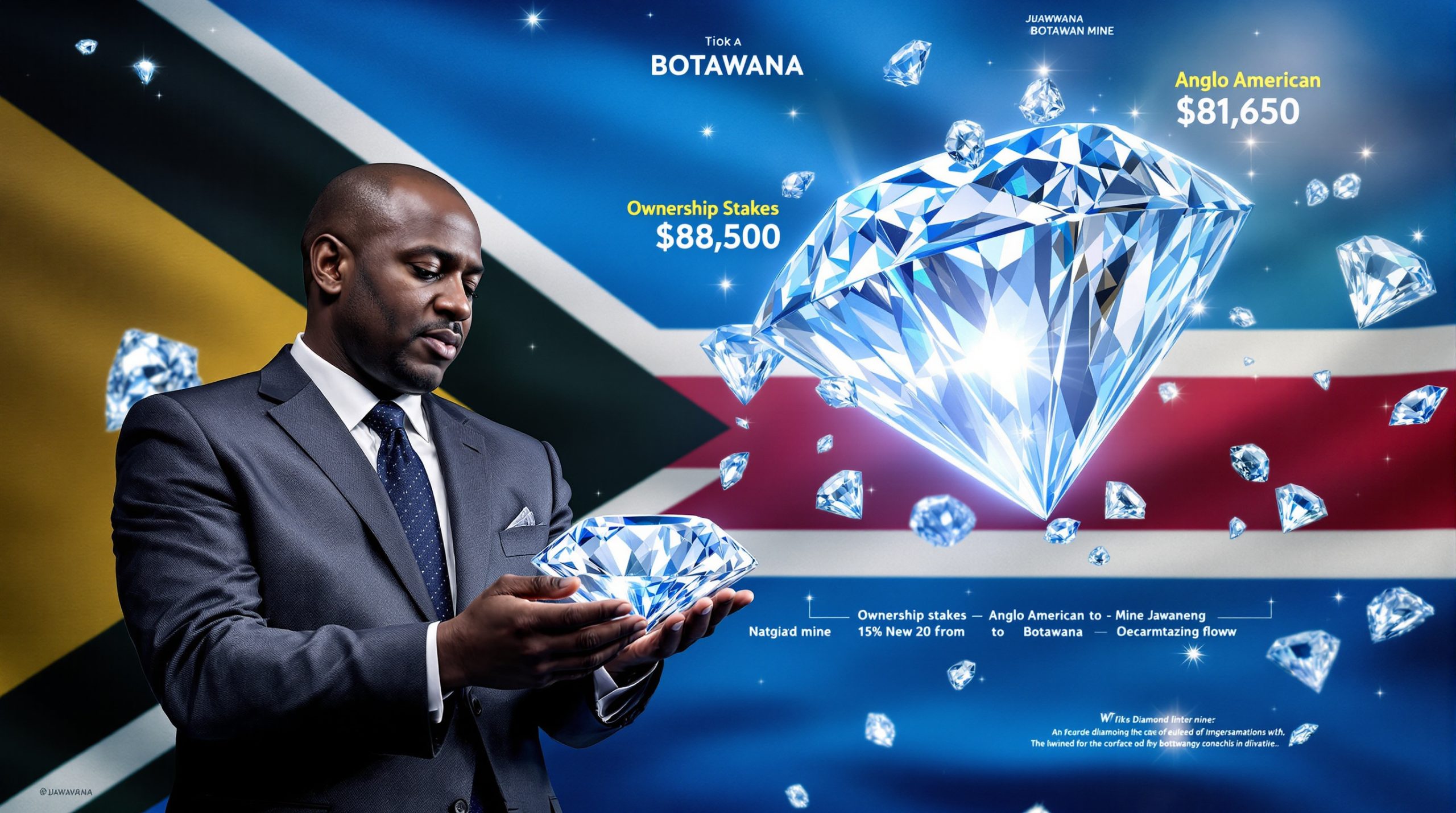Strategic Lithium Supply Partnerships: Understanding the Anson-LG Energy Solution Deal
The lithium supply landscape is experiencing a transformative shift as battery manufacturers secure long-term partnerships with mining companies to establish reliable supply chains. The recent lithium supply deal with LG Energy Solution between Australian miner Anson Resources and South Korean battery giant represents a significant development that signals important trends in the global battery materials market.
What Makes the Anson-LG Energy Solution Deal Significant?
The lithium supply agreement between Anson Resources and LG Energy Solution stands out for several compelling reasons. Under the terms of the partnership, LG Energy Solution will purchase up to 4,000 dry metric tons of battery-grade lithium carbonate annually from Anson's Paradox Basin project in southern Utah. This arrangement spans an initial five-year term with a potential five-year extension option, creating a decade-long supply relationship.
Supply is scheduled to commence in 2028, aligning with Anson's project development timeline. The deal represents approximately 40% of Anson's initial production capacity at the Paradox Basin project, which is estimated at around 10,000 tons annually.
Market reaction to the announcement was overwhelmingly positive, with Anson's stock surging 24.7%, recording its strongest intraday gain in over two months. This performance was particularly impressive given the broader market context, with the benchmark ASX 200 declining 0.6% during the same period.
Strategic Location and Supply Chain Implications
The geographic location of the lithium source represents a critical aspect of this partnership. The Thacker Pass lithium mine and the Paradox Basin in southern Utah positions Anson as a provider of domestically-produced U.S. lithium supply, a factor of growing importance in the battery supply chain.
Battery manufacturers are increasingly prioritizing regional supply security as geopolitical tensions and supply chain vulnerabilities have exposed risks in globally distributed production networks. This focus on domestic sourcing aligns with the broader trend toward supply chain resilience and security.
The U.S. location may also provide advantages under the Inflation Reduction Act, which incentivizes domestic battery material sourcing and production. As automakers and battery manufacturers aim to qualify for tax credits and other benefits, partnerships with U.S.-based lithium producers become increasingly valuable.
How This Agreement Fits Into Global Battery Supply Chains
Current Lithium Market Dynamics
The Anson-LG agreement comes during a period of significant transition in the lithium market. Despite lithium prices experiencing a year-long downturn through 2025 due to slower-than-anticipated electric vehicle adoption, battery manufacturers continue to secure long-term supply agreements.
This apparent contradiction reflects the strategic thinking of major battery producers, who recognize that temporary market fluctuations shouldn't derail long-term supply security planning. While immediate demand may have softened, the fundamental trajectory toward electrification remains intact, requiring substantial lithium resources in coming years.
Industry analysts note that competition among battery manufacturers for quality lithium sources continues to intensify despite current market conditions. Companies are looking beyond immediate price considerations to secure stable, consistent supply of battery-grade lithium refinery materials that meet their stringent specifications.
Battery Manufacturing Strategic Positioning
The agreement provides strong evidence of "firming U.S. battery manufacturing" commitments, as noted by market observers. Despite temporary headwinds in EV adoption rates, battery manufacturers are maintaining their strategic investments in securing critical materials.
This forward-thinking approach demonstrates how manufacturers are prioritizing future supply security over short-term price advantages. The partnership also highlights the critical role of lithium in next-generation battery technologies, which continue to require high-quality lithium carbonate as a fundamental input.
LG Energy Solution's willingness to commit to long-term offtake beginning in 2028 signals confidence in both the project's viability and the long-term demand outlook for lithium-ion batteries, regardless of current market fluctuations.
Financial Implications of the Partnership
Benefits for Anson Resources
For Anson Resources, the agreement represents what market analysts have described as a "company-making deal." The partnership is expected to provide significant support for Anson's debt funding efforts when the company reaches the final investment decision stage for the Paradox Basin project.
The offtake agreement provides critical revenue certainty that enhances the project's bankability. By securing a commitment from a major global battery manufacturer for 40% of its initial production capacity, Anson has substantially de-risked the project from a financial perspective.
This type of agreement establishes credibility with potential investors and lenders, demonstrating market validation of both the project and the company's execution strategy. Beyond immediate financial considerations, the deal creates a foundation for a long-term partnership that could extend beyond the initial agreement terms.
Investor Reaction and Market Sentiment
The market's positive reaction to the announcement—driving Anson's strongest intraday stock gain in over two months—signals investor confidence in both the deal's terms and its strategic implications. The sharp stock price increase occurred despite challenging broader market conditions, with the ASX 200 declining during the same period.
This performance indicates market confidence in lithium's long-term prospects despite the current price environment. Investors appear to be looking beyond immediate market conditions to recognize the strategic value of securing quality lithium offtake agreements with tier-one customers.
The stock movement also validates Anson's project development strategy and execution to date, suggesting market approval of the company's approach to advancing the Paradox Basin project toward production.
Comparison to Other Recent Lithium Supply Agreements
Emerging Patterns in Lithium Offtake Agreements
The Anson-LG Energy Solution deal reflects several emerging patterns in lithium supply agreements. Recent partnerships demonstrate a trend toward longer-term commitments with extension options, moving beyond traditional shorter-term arrangements to provide greater certainty for both producers and customers.
There's a growing focus on securing U.S.-based lithium sources as battery manufacturers and automakers position themselves to maximize benefits under regulatory frameworks like the Inflation Reduction Act. These agreements increasingly specify battery-grade lithium carbonate, reflecting manufacturers' requirements for high-quality materials that meet strict specifications.
Another pattern involves targeting significant portions of project production capacity—in this case, approximately 40%—to balance the producer's need to diversify customer exposure while providing meaningful volume commitments to key partners.
Strategic Positioning Among Battery Manufacturers
Competition for quality lithium sources is intensifying among battery manufacturers, even amid temporary market softness. LG Energy Solution has been particularly active in securing multiple supply agreements across different regions, implementing a geographical diversification strategy while maintaining focus on regional supply chains.
Battery producers are increasingly diversifying their supply chains while simultaneously maintaining regional focus—securing multiple sources within key manufacturing regions to balance security with logistical efficiency. There's also a growing emphasis on partnerships that support regulatory compliance requirements, particularly around domestic content provisions in major markets.
Future Battery Industry Trends Revealed by This Deal
Long-Term Market Outlook
The Anson-LG Energy Solution agreement provides several insights into how industry participants view the future battery landscape. Perhaps most significantly, it demonstrates that battery technology remains fundamental despite temporary market fluctuations, with major manufacturers willing to commit to supply beginning years in the future.
The deal highlights how the strategic importance of securing lithium supply transcends short-term price volatility. Battery manufacturers recognize that establishing relationships with quality producers now is crucial for long-term competitiveness, even if current market conditions might suggest caution.
There's growing recognition of the value of U.S. domestic lithium production, both for supply chain security and regulatory advantages. The continued investment in supply chain security despite current market challenges suggests confidence that demand will recover and accelerate as EV adoption increases over time.
Project Development Implications
The agreement validates development timelines extending to 2028 production, acknowledging the reality that bringing new lithium resources online is a multi-year process requiring significant planning and investment. This demonstrates financier confidence in lithium project economics over the longer term, looking beyond current price cycles.
The deal highlights the importance of offtake agreements in securing project financing, as lenders increasingly require evidence of market support before committing capital to resource development. It also shows preference for projects with a clear path to production, with defined timelines and development milestones.
Broader EV Industry Implications
Electric Vehicle Supply Chain Evolution
The Anson-LG agreement reflects how battery manufacturers are securing raw materials to support automaker production targets, even as those targets adjust to market realities. The growing importance of regional supply chains in battery component sourcing is evident, with manufacturers increasingly valuing proximity to both material sources and vehicle production facilities.
This partnership represents strategic positioning for anticipated EV market recovery and growth, looking beyond current adoption rates to the longer-term electrification trajectory. It demonstrates how industry participants are balancing current market realities with long-term electrification trends, making strategic investments despite temporary headwinds.
Regulatory and Policy Considerations
The increasing importance of domestic supply chains is clearly reflected in this agreement, with U.S.-based lithium production becoming a strategic advantage. The deal may provide potential advantages under U.S. Inflation Reduction Act provisions, which incentivize domestic content in batteries and electric vehicles.
There's growing focus on supply chain transparency and sustainability across the battery materials sector, with manufacturers increasingly concerned about the environmental and social footprint of their material sources. Regional manufacturing strategies are increasingly aligned with policy incentives, as companies position themselves to maximize benefits under supportive regulatory frameworks.
Technical Specifications in Lithium Supply Agreements
Product Quality Requirements
Battery-grade lithium carbonate specifications are a critical component of supply agreements, with manufacturers requiring materials that meet stringent purity and performance standards. Consistency and reliability of supply are equally important considerations, as manufacturing processes depend on predictable material characteristics.
Quality control and certification requirements have become increasingly rigorous, with battery manufacturers implementing extensive testing protocols for incoming materials. Technical compatibility with battery manufacturing processes is a fundamental consideration, as even minor variations in material properties can impact cell performance.
Production Capacity and Scaling
Anson's Paradox Basin project has an initial production capacity of 10,000 tons annually, with 40% allocated to the LG Energy Solution partnership. This leaves capacity available for additional partnerships while providing meaningful volume to LG Energy Solution.
The agreement may include provisions for potential production expansion beyond initial capacity, allowing both parties to benefit from project growth. The allocation aligns with LG Energy Solution's growth projections, providing material to support the manufacturer's expanding production capabilities.
How This Partnership May Evolve Over Time
Future Development Opportunities
There is potential for agreement extension beyond the initial 5-year term, with the option for an additional 5 years already built into the framework. As the relationship develops, possibilities for expanded production and supply volumes may emerge, particularly if Anson increases capacity at the Paradox Basin project.
The partnership could evolve to include joint technology development or processing innovations that benefit both parties. There are also opportunities for collaborative approaches to sustainability and efficiency improvements, as both companies work to reduce the environmental footprint of lithium production and utilization.
Market Adaptation Strategies
Long-term agreements typically include mechanisms for adjusting to changing market conditions, allowing flexibility within a stable framework. Price review structures within long-term agreements help ensure the partnership remains commercially viable for both parties despite market fluctuations.
Volume flexibility provisions may allow for adjustments based on actual production capabilities and customer requirements. As battery technology evolves, quality improvement and specification evolution will likely become important aspects of the ongoing relationship.
FAQ: Lithium Supply Partnerships
What factors determine the success of lithium supply agreements?
Several critical factors influence the success of lithium supply partnerships. Supply reliability ensures consistent material availability, while product quality consistency meets manufacturers' strict specifications. Well-structured pricing mechanisms balance fairness with market realities, and logistics efficiency minimizes costs and delays.
Regulatory compliance has become increasingly important, particularly regarding environmental standards and domestic content requirements. Successful agreements must balance price stability with flexibility to adapt to changing market conditions, providing certainty while acknowledging the dynamic nature of the battery materials market.
How do battery manufacturers evaluate potential lithium suppliers?
Battery manufacturers assess multiple criteria when selecting lithium supply partners. Production capacity and scalability ensure sufficient volume to meet growing needs. Technical capabilities and product quality are fundamental considerations, as materials must meet stringent specifications for battery manufacturing.
Financial stability is critical, as manufacturers seek partners who can sustain operations through market cycles. Environmental, social, and governance (ESG) performance has become increasingly important as sustainability concerns gain prominence. Geographic location impacts logistics costs, supply chain risks, and regulatory advantages.
Battery producers also consider regulatory alignment and supply chain transparency, particularly as policy frameworks increasingly incentivize domestic sourcing and sustainable production practices.
Why are U.S.-based lithium sources gaining strategic importance?
Domestic lithium production offers several significant advantages in the current market environment. Reduced logistics costs and lower supply chain risks improve resilience against global disruptions. Potential regulatory benefits under policies like the Inflation Reduction Act create financial incentives for domestically-sourced materials.
U.S.-based production offers improved supply chain transparency and control, allowing manufacturers to better monitor and verify sustainability practices. As geopolitical considerations increasingly influence industrial policy, domestic sourcing helps reduce dependency on materials from regions that may present political or supply security challenges.
Furthermore, recent Australia lithium innovations and Argentina lithium opportunities have increased global competition, making U.S. sources more valuable as part of a diversification strategy.
How do lithium supply agreements impact mining project development?
Securing offtake agreements is often critical for obtaining project financing, as lenders typically require evidence of market demand before committing capital. These agreements demonstrate market validation, showing that sophisticated industry participants believe in the project's viability.
Offtake partnerships establish revenue certainty, making financial projections more reliable and reducing project risk. They provide critical support for investment decisions, helping companies advance from exploration to production with greater confidence. Well-structured agreements can also facilitate project expansion and development beyond initial production parameters.
Geothermal lithium extraction and other innovative technologies are also being incorporated into new supply agreements, showing the industry's willingness to embrace alternative production methods that may offer sustainability advantages.
Disclaimer: This article contains forward-looking statements about market developments and company performance. These statements involve risks and uncertainties, and actual results may differ materially from those discussed. Readers should not interpret this article as financial advice or investment recommendations.
Ready to Identify the Next Big ASX Mineral Discovery?
Discover how the proprietary Discovery IQ model can alert you to significant ASX mineral discoveries before the market reacts, just as it did with major lithium opportunities. Explore historic returns from game-changing discoveries at the Discovery Alert discoveries page and position yourself ahead of the market.




